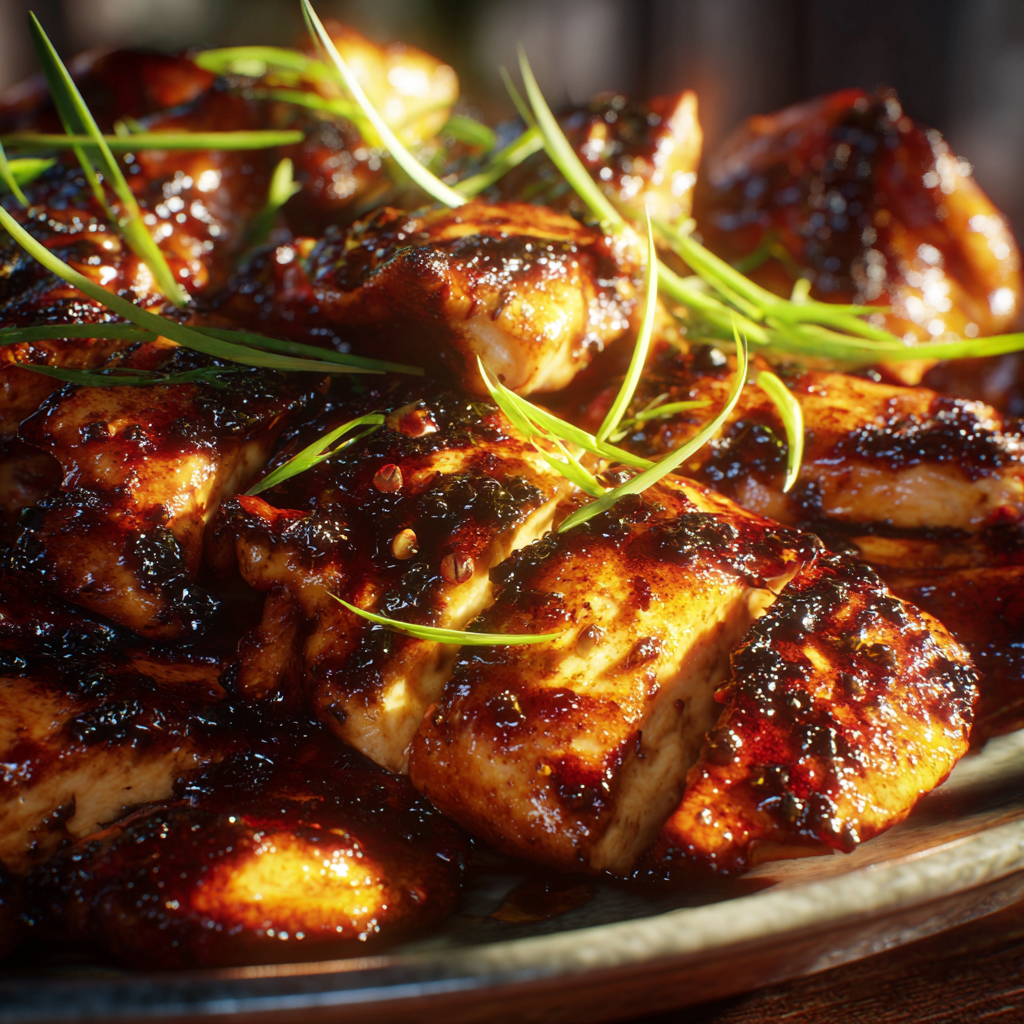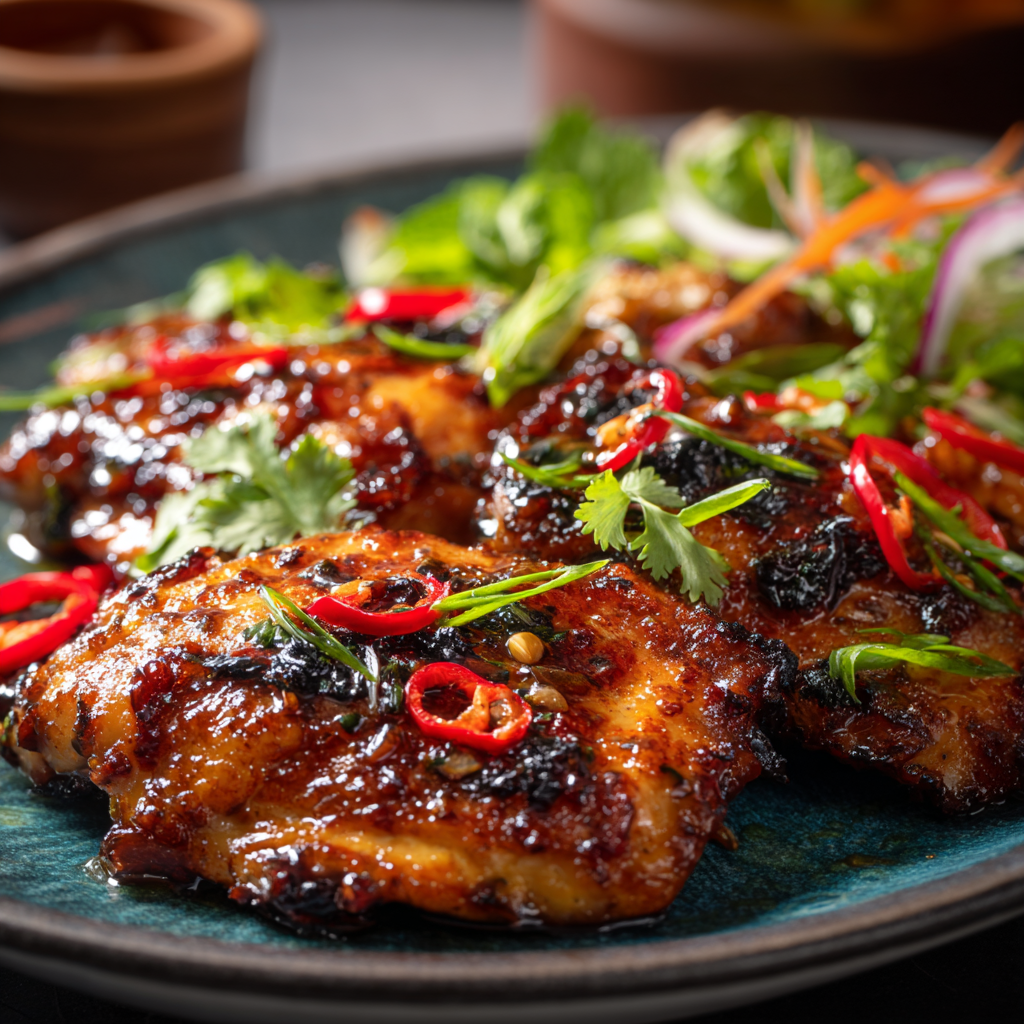
What Makes an Oriental Chicken Marinade Special?
I love cooking with bold flavors. An oriental chicken marinade is one of my go-to recipes. It’s simple, yet it transforms plain chicken into something amazing. Let me share why this marinade stands out.
First, it uses ingredients you can find easily. Soy sauce, garlic, ginger, and sesame oil are staples. These create a rich taste that’s both savory and slightly sweet. Many ask, “What do Chinese soak their chicken in?” The answer often starts with these basics.
Second, the process is quick. Marinating doesn’t take hours. Even 30 minutes makes a big difference. This saves time while still delivering flavor-packed results.
How to Make Chinese Style Chicken Marinade at Home
Let’s break down how I make my Chinese style chicken marinade. Here’s what you’ll need:
- 1/4 cup soy sauce
- 2 tablespoons rice vinegar
- 1 tablespoon honey or brown sugar
- 2 cloves garlic, minced
- 1 teaspoon grated ginger
- 1 tablespoon sesame oil
- A pinch of red pepper flakes (optional)
Mix everything in a bowl. Add your chicken and coat it well. Cover and let it sit. That’s it! You now have a flavorful base for grilling, baking, or stir-frying.
Some people ask, “What do the Chinese use to marinate meat?” They rely on balance. Sweetness from honey, saltiness from soy sauce, and depth from sesame oil work together. This trio creates harmony in every bite.
Tips to Make Your Chicken Tender and Juicy
Ever wondered how Asians make their chicken so tender? Here’s my secret. It’s not just about the marinade. A key step involves a little prep work.
- Pound the chicken: Use a meat mallet to flatten thicker pieces. This helps them cook evenly.
- Add a bit of cornstarch: Mix 1 teaspoon into the marinade. Cornstarch locks in moisture.
- Don’t overcook: Keep an eye on cooking times. Overcooked chicken gets dry fast.
These tricks boost tenderness. Pair them with your oriental chicken marinade, and you’ll have juicy, flavorful chicken every time.
Variations to Try With Your Marinade
Once you master the basic recipe, try new twists. Here are some ideas:
- Spicy kick: Add sriracha or chili paste for heat.
- Citrus twist: Squeeze fresh orange or lime juice into the mix.
- Herb boost: Stir in chopped cilantro or green onions before serving.
Each variation adds a unique touch. Experiment until you find your favorite combo.
Why This Marinade Works So Well
The magic lies in the ingredients. Soy sauce brings umami. Garlic and ginger add aroma. Sesame oil ties it all together. Together, they infuse the chicken deeply.
Another bonus? This marinade doubles as a sauce. After cooking, drizzle leftovers over rice or veggies. It ties the whole dish together beautifully.
I often tell friends, “Flavor doesn’t have to be complicated.” This marinade proves it. Simple steps lead to impressive meals.

Understanding the Magic of Oriental Chicken Marinade
You know, I’ve always been fascinated by how a simple marinade can completely transform chicken. It’s like magic in a bowl. One moment, you’re staring at plain old chicken breasts, and the next, you’ve got something that smells amazing and tastes even better. That’s the power of an oriental chicken marinade. But here’s the thing: not all marinades are created equal. Some just sit there, while others dive deep into the meat, infusing every bite with flavor.
By the way, have you ever wondered what makes Chinese-style chicken so tender? They don’t just toss it in oil and hope for the best. Nope. The secret lies in the marinade—and sometimes a bit of science. For example, many Asian recipes use ingredients like soy sauce, rice wine, or even baking soda to break down tough fibers in the meat. If you’re curious about this, check out my recipe for soy sauce marinade for chicken, which dives deeper into this technique.
Speaking of techniques, let me share a little story. A few years back, I visited a friend who swore her mom had the best chicken recipe ever. When I asked her what made it special, she said, “It’s all in the soaking.” Turns out, they marinate their chicken overnight in a mix of ginger, garlic, sesame oil, and something she called “five-spice powder.” I was skeptical at first but decided to give it a shot. Let me tell you—it blew my mind. The chicken practically melted in my mouth!
The Key Ingredients for an Authentic Flavor
Now, if you’re wondering what exactly goes into an authentic oriental chicken marinade, let me break it down for you. These are the MVPs:
- Soy Sauce: This is non-negotiable. Not only does it add saltiness, but it also helps tenderize the meat. Funny enough, different types of soy sauce can change the entire vibe of your dish. Light soy sauce gives a milder taste, while dark soy sauce adds depth and color.
- Ginger and Garlic: These two work together like peanut butter and jelly. They bring warmth and aroma that make your kitchen smell incredible. Plus, they pair beautifully with almost any protein.
- Sesame Oil: Just a splash can elevate your marinade to another level. It has this nutty richness that screams “homemade goodness.”
- Rice Wine or Rice Vinegar: Ever notice how some dishes taste slightly tangy yet sweet? That’s often thanks to these ingredients. They balance out heavier flavors and keep things interesting.
Oh, and don’t forget about spices! Five-spice powder is a classic choice for an oriental chicken marinade. It’s a blend of star anise, cloves, cinnamon, Sichuan peppercorns, and fennel seeds. Trust me, once you try it, you’ll want to sprinkle it on everything. If you’re looking for more inspiration, take a peek at my Italian marinade for chicken. Yes, it’s not oriental, but the concept of layering flavors applies across cuisines.
Tenderizing Secrets You Didn’t Know About
Here’s a fun fact: Asians don’t just rely on marinades to make their chicken tender—they’ve got tricks up their sleeves. One trick I learned involves using cornstarch. Weird, right? But hear me out. Cornstarch creates a protective coating around the chicken when cooked, locking in moisture and preventing it from drying out. Try mixing a tablespoon into your marinade next time, and see the difference for yourself.
Another method? Acidic components like citrus juice. Lemons, limes, or even oranges can help break down proteins without overpowering the flavor. Actually, speaking of citrus, I recently experimented with a citrus chicken marinade, and wow—it was refreshing. Imagine biting into juicy chicken with a zesty kick. Perfect for summer barbecues!
But wait—there’s more. Ever heard of using yogurt as a tenderizer? While it’s not traditionally Asian, it works wonders. The enzymes in yogurt gently soften the meat, making it super succulent. And guess what? You can totally combine yogurt with your favorite oriental chicken marinade ingredients. Think of it as fusion cooking at its finest.
How Long Should You Marinate?
Okay, so now you’ve got your ingredients ready, but how long should you let the chicken soak? Honestly, it depends. For quick weeknight dinners, 30 minutes to an hour will do the job. However, if you’re aiming for maximum flavor penetration, go for at least 4–6 hours—or better yet, overnight.
I remember one time I forgot about a batch of chicken marinating in the fridge. Twelve hours later, I panicked, thinking I’d ruined dinner. But nope—it turned out insanely flavorful. Lesson learned: patience pays off. Just be careful not to over-marinate, especially if you’re using acidic ingredients like vinegar or lemon juice, as they can start to “cook” the chicken and alter its texture.
Pairing Your Marinade with Cooking Methods
One last tip before we wrap up this section: think about how you’re going to cook your chicken. Different methods complement different marinades. For instance, grilling brings out the smoky notes in a soy-based marinade, while baking allows the flavors to meld slowly and evenly. Stir-frying, on the other hand, works well with lighter marinades since high heat can burn sugary sauces.
And hey, don’t limit yourself to chicken breasts. Drumsticks, thighs, and even wings love a good soak too. In fact, I once tried a mustard chicken marinade on wings, and oh boy, it was finger-licking good. Totally unexpected, but sometimes those experiments pay off big time.
So there you have it—a crash course in mastering the art of the oriental chicken marinade. Whether you stick to tradition or get creative with new combinations, the key is to enjoy the process. After all, cooking should feel less like a chore and more like a delicious adventure.

Mastering the Art of Oriental Chicken Marinade: Final Tips and Tricks
You know, I’ve been experimenting with oriental chicken marinade recipes for years now, and every time I think I’ve nailed it, I discover something new. It’s like this endless journey where each tweak makes the dish just a little more exciting. So here’s the thing—while you’ve probably got the basics down by now, there are some lesser-known tricks that can take your marinade game to the next level.
First off, let’s talk about texture. Ever wondered how Asian chefs manage to make their chicken so tender? Well, they often use a technique called “velveting.” This isn’t exactly a secret, but it’s not talked about enough. Velveting involves coating the chicken in a mixture of cornstarch, egg white, and a bit of oil before cooking. The result? Insanely smooth and juicy meat. I tried it once on a whim, and trust me—it’s a game-changer.
By the way, if you’re wondering what to soak your chicken in before applying the marinade, here’s a pro tip: a quick brine. A simple solution of water, salt, and sugar (and maybe a splash of soy sauce) works wonders. It’s funny because people often skip this step, thinking it’s too fussy, but honestly, it only takes 15-30 minutes and makes such a difference. You’ll notice the chicken holds onto its juices better during cooking.
Actionable Tips for Perfecting Your Marinade
Let’s dive into some actionable tips you can start using right away:
- Balance is key: A good oriental chicken marinade should have a mix of salty, sweet, tangy, and umami flavors. Soy sauce brings the saltiness, honey or brown sugar adds sweetness, rice vinegar gives acidity, and ingredients like sesame oil or miso paste boost umami.
- Don’t rush it: Sure, you can slap together a marinade and cook immediately, but letting the chicken sit for at least an hour—or even overnight—makes all the difference. Patience really pays off here.
- Add aromatics: Fresh ginger, garlic, and green onions are staples in many Asian kitchens for a reason. They infuse the chicken with layers of flavor that feel authentic and complex.
- Use a zip-top bag: Instead of mixing everything in a bowl, toss the chicken and marinade into a resealable plastic bag. It ensures every piece gets coated evenly and saves on cleanup time.
Funny enough, one of my favorite discoveries was completely accidental. I ran out of soy sauce once and decided to substitute tamari instead. Not only did it work beautifully, but it also had a richer, deeper flavor. Now I keep both in my pantry because sometimes switching things up leads to unexpected greatness.
Cultural Insights and Personal Touches
Here’s a little story for you. A few years back, I visited a small family-run restaurant in Chinatown, and they shared their secret for making their signature dish unforgettable. Turns out, they always add a splash of Shaoxing wine to their marinades. If you haven’t heard of it, Shaoxing wine is a type of Chinese cooking wine made from fermented rice. It has this subtle nutty aroma that elevates dishes instantly. I came home and started incorporating it into my own recipes, and wow—it’s become a staple ever since.
Speaking of secrets, did you know that Chinese cooks often use baking soda to tenderize tougher cuts of meat? Just a pinch mixed into the marinade softens the fibers without affecting the taste. However, be careful not to overdo it; otherwise, it might leave a slightly chalky aftertaste.
Oh, and here’s another random tidbit—I love adding a teaspoon of five-spice powder to my oriental chicken marinade. It’s this magical blend of star anise, cloves, cinnamon, Sichuan peppercorns, and fennel seeds that smells amazing and tastes even better. One bite, and you’ll feel like you’ve been transported to a bustling street market in Taipei.
Final Thoughts Before You Get Cooking
At the end of the day, mastering the art of oriental chicken marinade isn’t about following rules—it’s about embracing creativity. Try different combinations, adjust based on your preferences, and don’t stress too much about perfection. After all, food is supposed to bring joy, right?
If you’re looking for more inspiration, check out our collection of chicken marinades, where we explore everything from spicy Korean gochujang blends to Thai lemongrass-infused sauces. Trust me, there’s no shortage of ideas to keep your meals exciting!
Conclusion
So there you have it—whether you’re aiming for tenderness, bold flavors, or cultural authenticity, these tips will help you create an unforgettable oriental chicken marinade. Remember, cooking is as much about experimentation as it is about tradition. Have fun, stay curious, and most importantly, enjoy the process. Happy marinating!
Frequently Asked Questions
- How to make Chinese style chicken marinade?
To make a classic Chinese-style chicken marinade, combine soy sauce, oyster sauce, sesame oil, minced garlic, grated ginger, and a touch of sugar. For extra tenderness, include a bit of cornstarch and let it rest for at least 30 minutes. - What do Chinese soak their chicken in?
Many Chinese cooks use a combination of soy sauce, Shaoxing wine, and aromatics like ginger and garlic. Some also incorporate a brief brine or velveting technique for added moisture. - How do Asians make their chicken so tender?
Techniques like velveting (coating in cornstarch and egg whites), using baking soda sparingly, and marinating with acidic ingredients like vinegar or citrus help achieve tender results. - What do the Chinese use to marinate meat?
Common ingredients include soy sauce, hoisin sauce, rice wine, sesame oil, garlic, ginger, and five-spice powder. These elements create a balance of flavors while tenderizing the meat. - Can I freeze chicken after marinating it?
Absolutely! Place the marinated chicken in a freezer-safe bag or container and store it for up to three months. Thaw completely before cooking for best results. - Is it okay to reuse marinade?
No, never reuse raw marinade unless it’s boiled first. Raw marinade contains bacteria from the meat, which can pose health risks if not properly cooked. - How long should I marinate chicken?
For optimal flavor, marinate chicken for at least one hour. Overnight marination yields the best results, especially for thicker cuts. - What can I substitute for soy sauce?
Tamari, coconut aminos, or Worcestershire sauce are great alternatives depending on dietary needs. Each offers a similar salty depth without compromising flavor. - Why does my marinade taste too salty?
Too much soy sauce or salt can overpower the dish. Balance it out by adding a bit of sugar, honey, or lime juice to counteract the saltiness. - Can I grill chicken marinated in an oriental sauce?
Yes, grilling works beautifully with oriental marinades. Just pat the chicken dry before placing it on the grill to prevent flare-ups caused by excess liquid.
